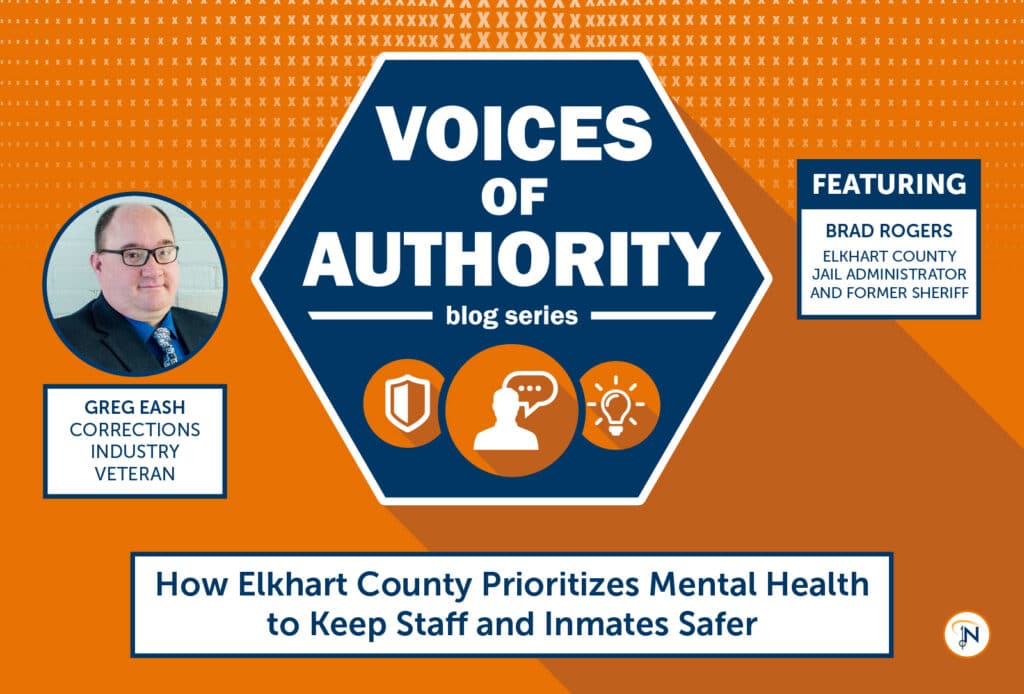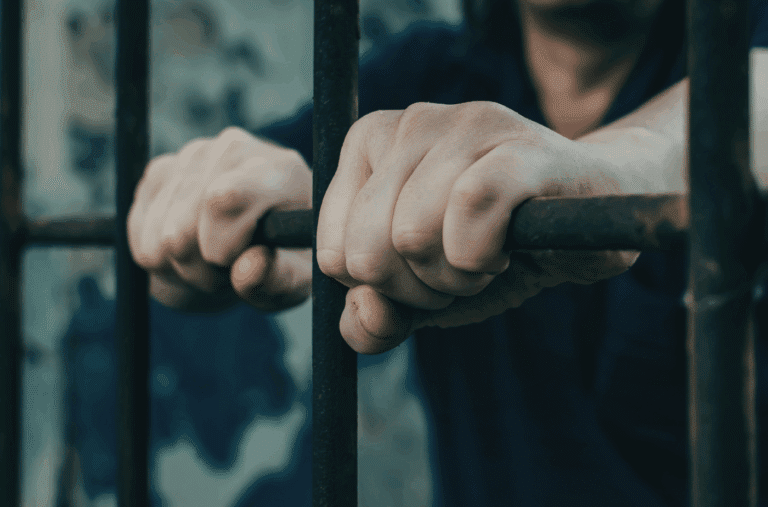In this series, Greg Eash, a 25-year veteran correctional officer specializing in classification and inmate behavior management, sits down with corrections experts who are making a difference in their communities to learn about their successes, challenges, and what’s next for their jail.
Greg: I’m here today with Captain Brad Rogers from the Elkhart County Sheriff’s department in Elkhart, Indiana. Brad is the jail administrator and former sheriff. So today we’re talking about Brad’s career and his vision of the future as well as mental health and the challenges that causes for jails. Brad, can you tell us a little bit about how your career started and how you got where you are today?
Brad: Well, thanks Greg. I’ve been at the Elkhart County Sheriff’s office for the last 32 plus years. I started in patrol, and I moved up through the ranks. In 2003, I think it was, I became the jail commander, and in 2010, I decided to run for sheriff. I won. And so from 2011 to 2018, I was the Elkhart County sheriff, and because Indiana has term limits, I had to step down. The next sheriff, the current sheriff, asked me to stay on as the jail commander, and I did.
We have a thousand-bed jail. Today we have about 860 inmates. We have an objective jail classification system, and we have officers dedicated to do those classifications. We have full-time medical coverage, and probably our biggest budget item of the year is medical, which includes mental health.
Greg: Mental health is a big challenge for every jail in the country right now. I think you guys are unique and that you’ve done some things to enhance mental health care. Could you talk to us about your approach?
Brad: In many counties throughout the country, the jail ends up being the largest mental health provider outside of mental health facilities.
But in any psychiatric hospital, you’re going to see very similar situations to what’s inside the jails, and that includes addictions.
“I would say probably 70% to 80% of my inmates are addicted to something, and that creates issues in and of itself.”
Brad Rogers
Elkhart County Jail Administrator
But then you have mental health problems that have really created the problem of why they’re here in the first place. You know, they might’ve broken into some place or they robbed somebody or assaulted somebody, but interestingly enough, if you look deeper into these individuals, typically mental health is the source of the problem.
And so there are lots of issues that we’re addressing and dealing with as a correctional facility. We have to be concerned about these mental health issues. We can’t just warehouse inmates. A judge has told them to be here, and so we’re their caretaker.
As a jail commander and as a past sheriff, I view that caretaking function as a huge responsibility. I take it very seriously. I don’t want inmates in my custody to be victimized. I don’t want them to experience street justice on my watch. Mental health is really a high priority in our facility.
Greg: How does your program work? And how much does it cost?
Brad: We spend close to $3 million a year in medical costs. A good part of that is mental health. We have mental health social workers, we have a psychiatrist on staff, and it’s 24/7 coverage. That doesn’t mean the psychiatrist is here 24/7, but we have access to them. They’re on call and during the day, they’re typically here.
And of course, the social workers are here as well. They’re the ones that help us classify somebody in a dangerous situation. We don’t want people to commit suicide in here under our watch, and we don’t want anyone—inmates or staff—to be assaulted.
I think we do very well. Maybe once a month or so we might have an assault on staff. Even inmate-on-inmate assaults, we may have one a week, but we don’t typically have daily assaults on either staff or inmates. Part of that is our classification, and part is our mental health dynamics.
The mental health issue is big, and we try to put resources toward it to keep that as a priority. We’re able to get people the help they need and transition them through medication and behavioral management. We also have the connection with the local psychiatric hospital, and we can transition them to further appointments and so on if they’re released.
It is a very big challenge, and it is something that I think is only going to get worse as time goes on because the funding for mental health seems to be disappearing. Even at the state hospital level, it seems to be going away. We only have a few beds for our county in a state hospital, and those are reserved for the worst cases. The rest seem to get lost in the shuffle, or end up serving time in jail, and we continue to try to work with them and get them the help they need.
Greg: In corrections, we’ve been saying that there’s a mental health issue for, I don’t know, 15 years now. It’s finally to this boiling point where nationally, there’s some discussion about it. Thinking back as you have all these things that happen in the jail, behavior issues and so forth, they’re really rooted in mental illness. It’s becoming more and more necessary for staff to understand mental health issues in order to deal with behavior. So are you doing any kind of specific training for that? How do you help your staff to understand the mental health issue behind some of the inmate behavior they observe?
Brad: Well, a lot of it is through training and making sure that we get our vendor or the mental health side and medical side involved in that annual training. Anything from suicide prevention to dealing with people with autism or schizophrenia to people with developmental disabilities, we need to make sure we’re meeting basic needs and identifying certain critical issues that officers can raise with the medical team.
In our agency, it’s a team effort, and we want to make sure that the corrections officers have the resources they need.
Greg: I’m curious, does the county have a crisis intervention team (CIT) of any sort where they can intervene and try to divert somebody who’s in a mental health crisis away from jail and into treatment?
Brad: We do, but it’s not perfect. When we talk about the team effort, it’s not just a matter of the agency, it’s coupling with emergency rooms and psychiatric hospitals and the doctors that are contained there.
We can divert somebody from the criminal justice system, but the problem is the emergency rooms and the psychiatric hospitals don’t seem to be on the same wavelength as us right now. If somebody has a bit of propensity for violence, then the doctors say, “Well, then you have to take them to jail. We’re not going to deal with them.” And jail is not the best place for them. We can secure them and we can keep them from injuring someone else, but we’re not what they really need.
We’re not talking about mass murderers here. We’re not talking about somebody who’s committed a heinous crime. We’re just talking about maybe somebody who’s disorderly, maybe intoxicated or on drugs, who needs some intervention. We would prefer that instead of incarcerating someone just to incarcerate them, to take them to a mental health facility or a hospital where they can step down from this addiction or be given some medication to counteract it and to help manage their behavior.
Jails aren’t meant for the seriously mentally ill, and that’s what we’ve been thrown into right now. We don’t want to be the local community mental health facility. But to some degree, we’ve been put into this trick bag where we’re forced to do our best to work with other agencies—psychiatric hospitals and hospitals—with our mental health people to try to get these people out. And it all comes back to we don’t have the resources available out in the community for the mentally ill people who are out there.
Those are some of the things we’re seeing on the horizon and some of the things we’re combating as an agency. We’ll continue to forge ahead, but I’ll tell you, mental health in jails, it’s not going to go away anytime soon. It’s only going to get worse. We’ll have to continue to keep it in the forefront and let people know that this is a real issue out here and we need to put some resources toward solving it.
Greg: Thank you, Brad, for your time. We’ll probably hear from many other jail administrators on the challenge of mental health, so thank you for your service.
Greg Eash has worked in law enforcement and corrections for over 25 years. After graduating from Vincennes University with a degree in Law Enforcement, Greg worked as a patrolman for a year before joining the Elkhart County Sheriff’s Office in Elkhart, Indiana, in 1995. He attended the Indiana Law Enforcement Jail Academy and steadily rose through the ranks throughout his career, most recently serving as Jail Warden. Greg specializes in classification and inmate disciplinary processes, and he is currently the operations manager over the Supervision & Custody division at equivant.
Get in touch with the equivant team for technology and classification tools that help jails work smarter.







